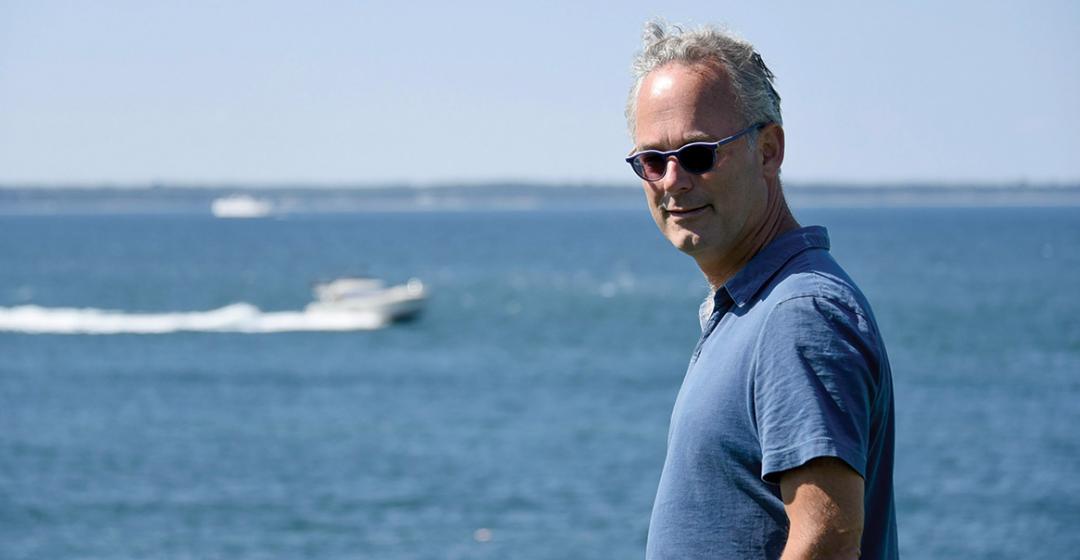Author and lifelong Vineyard summer resident Amor Towles is often asked if he writes from personal experience. On the one hand, it’s an odd presumption: his New York Times–bestselling novels have taken readers from post-Depression Manhattan (Rules of Civility) to a thirty-year sprawl in twentieth century Russia (A Gentleman in Moscow). His most recent offering, The Lincoln Highway, is a coming-of-age cross-country adventure tour de force set over ten days in 1954 (a decade before the author’s birth). But when speaking to Towles there is a sense that if a writer’s work doesn’t come strictly from his own life experiences, it can certainly grow from them. Ahead of his return to the Martha’s Vineyard Author Series at the Performing Arts Center on August 14, Towles spoke with this magazine about the gift of delayed research, summer reading, and why the Vineyard is not, in fact, his favorite place to write.
MVM: It has been widely reported that at the age of twelve you were a town columnist for the Vineyard Gazette, famously inventing a town resident and detailing his imagined escapades. Was this your first summer job?
Amor Towles: My first jobs were all on the Vineyard. My grandmother came to the Island with her mother in the 1920s, and my family has been spending full summers in West Chop ever since. I was a lawn mower in Vineyard Haven; I wrote the West Chop column; I was a dishwasher in the inn there when I was fourteen.
My books are invented circumstances with invented characters, but there’s no question that the job I had working in that kitchen was influential in the writing of A Gentleman in Moscow (Viking, 2016). The camaraderie of what happens behind the swinging doors, the hierarchy in the kitchen between the chef and the sous chef and the waitresses – it was all influenced by those memories.
MVM: You’re not a writer who does extensive research before starting a project. And yet each of your books is deeply rooted in specific and richly detailed historical context. How do you manage this?
AT: I try to write about things that I’ve had a long-standing interest in. I knew Russian history. I knew New York in the 1930s. I can often hear the research when I read a book that feels like it’s the product of something that was studied yesterday. It’s not seen in its fullest and simplest form, in the way a child sees it. You want to have the eyes of the child seeing in fiction.
When I’m done with a draft, I’ll have a list of things that I want to go back and look at more – but it’s strange little things, like how big is the box of a freight car, literally; how many feet across.
MVM: Does the research you’ve done after completing a draft ever send you off in a new direction?
AT: The Lincoln Highway (Viking, 2021) takes place over the course of ten days in 1954. So there I am, I’ve finished the book. It’s my expression of America at the time, and I feel good about it. But then I go back and read the front page of The New York Times for those ten days. And there on day three it says there will be a simulation of a nuclear attack in Times Square. The streets will be cleared, all activity will stop for ten minutes.
Now, this is the craziest thing I’ve ever heard! At this point, the novel is written. I’ve made my decision of how the Cold War will figure in, and Times Square already plays a significant part in the novel. So I think, this is a gift. It doesn’t change everything, but it provides a new little detail.
MVM: You still spend parts of each summer on the Vineyard. While you’re here, what do you read?
AT: In the winter, I read with three friends and we tend to read great writers, literature from about 1850 to 1950. When I come to the Vineyard, I read crime. I like to pick a writer and read them chronologically.
I had a summer when I read all of John Le Carre’s George Smiley novels. This year I’m reading the [Belgian] writer Georges Simenon, his Inspector Maigret series. They were William Faulkner’s favorites.
MVM: Do you work while you’re here?
AT: Here’s the truth: when my family comes to the Vineyard every July, it’s the most productive month of my writing year. But it’s because my primary residence is empty, and the notion of uninterrupted time is extremely valuable. So I stay in New York and come to the Vineyard on the weekends, and I use this month to make leaps in my work.
The reason the difference is so extreme is that I have fifty good reasons not to be working every day when I’m on the Vineyard. I want to go to Back Door Donuts at midnight with my daughter; I want to get up and play tennis with my brother in law and then I want to go for a swim.





